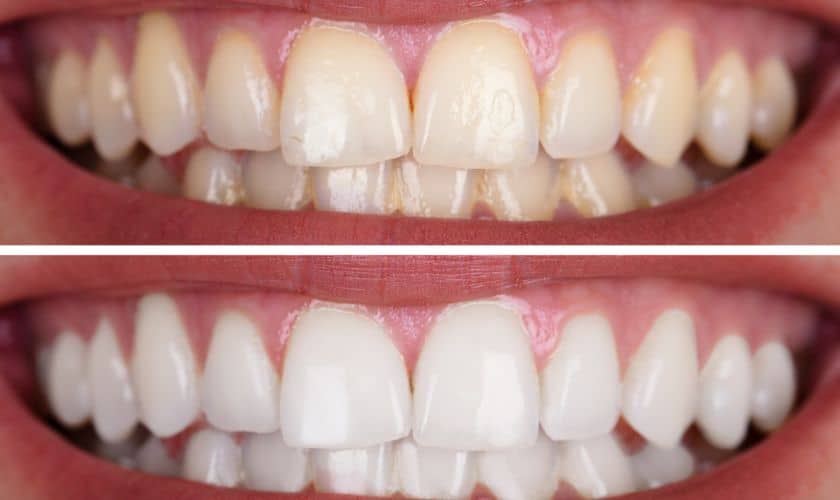Your diet plays a significant role in the effectiveness of teeth whitening. In this blog post, we’ll explore how certain foods and beverages can cause tooth staining and discuss what to avoid or include in your diet for whiter teeth. Discover the fascinating link between diet and teeth whitening for a brighter, healthier smile.
The Impact of Diet on Teeth Staining
The food and drinks we consume daily can significantly impact the color of our teeth. Certain items in our diet can contribute to teeth staining, leaving them dull and discolored. Understanding the connection between diet and teeth staining is essential to maintaining a bright smile.
One of the main culprits behind tooth discoloration is dark-colored beverages such as coffee, tea, red wine, and cola. These drinks contain pigments called chromogens that easily attach themselves to the enamel of your teeth, resulting in stains over time. Additionally, acidic beverages like citrus juices and sports drinks can erode your tooth enamel, making it easier for stains to set in.
Regarding foods, some notorious offenders include berries (such as blueberries), tomato sauce, soy sauce, curry powder, and balsamic vinegar. These foods contain intense pigments that can penetrate your tooth enamel and cause unsightly stains.
It’s not just about avoiding certain foods; incorporating teeth-friendly options into your diet is crucial for maintaining a brighter smile. Crunchy fruits and vegetables like apples or carrots act as natural abrasives that help remove surface stains from teeth while stimulating saliva production – nature’s way of washing away debris.
In addition to fruits and veggies high in fiber content, dairy products like milk or cheese are beneficial for oral health due to their calcium content. Calcium helps strengthen tooth enamel while reducing the risk of dental erosion caused by acidic food or drink.
Maintaining good oral hygiene practices, such as regular brushing with whitening toothpaste after consuming stain-causing foods/drinks, can help combat discoloration effectively.
Remember that everyone’s body reacts differently to various substances – what may stain one person’s teeth significantly might have minimal effects on another individual. It’s always best to consult a dental professional who can provide personalized advice based on your needs for maintaining white smiles!
Foods and Beverages to Avoid for Whiter Teeth
When it comes to achieving a whiter smile, the food and beverages we consume play a significant role. Certain foods and drinks have the potential to stain our teeth over time, making them appear dull or yellow. To maintain that bright, white smile, it’s important to be mindful of what we eat and drink.
One culprit known for staining teeth is coffee. While many of us rely on that morning cup of joe to kickstart our day, the dark pigments in coffee can leave unsightly stains on our teeth. Similarly, tea can also contribute to tooth discoloration due to its natural colorants.
Another common offender is red wine. With its deep hue and acidity, red wine can penetrate enamel and leave behind stubborn stains. If you enjoy a glass (or two) of red wine in the evenings, rinse your mouth with water afterward, or consider using a straw when sipping.
Dark-colored berries such as blueberries and blackberries are deliciously nutritious but can wreak havoc on your pearly whites. These fruits contain intense pigments that easily adhere to tooth enamel and cause staining.
Sodas and sugary beverages should also be avoided if you’re aiming for whiter teeth. These drinks often contain high levels of sugar, leading to tooth decay, and their dark colorings can stain your teeth over time.
By being mindful of these foods and beverages notorious for causing tooth stains, you’ll take an important step toward maintaining a brighter smile. Remember, though – moderation is key! Enjoying these items occasionally won’t have as much impact as consuming them regularly or in large quantities.
Other Factors Affecting Teeth Whitening in Knoxville
Factors beyond diet can influence teeth whitening effectiveness in Knoxville:
- Oral Hygiene: Regular brushing and flossing help remove and prevent surface stains.
- Lifestyle Habits: Quitting smoking or tobacco use benefits overall health and maintains a brighter smile.
- Genetics: Some individuals may have a genetic predisposition to yellow or stained teeth, but professional whitening treatments can help.
- Medications and Medical Conditions: Certain medications or medical conditions can affect tooth color. Discuss these with your dentist before whitening procedures.
- Age: Aging leads to thinner enamel and more visible dentin, causing teeth to appear darker.
The relationship between diet and teeth whitening in Knoxville is undeniable. Our dietary choices play a crucial role in maintaining a bright, radiant smile. Avoiding foods and beverages that stain teeth, such as coffee, red wine, and certain fruits, while incorporating teeth-friendly options like crunchy vegetables, dairy products, and water, can significantly impact the effectiveness of teeth whitening treatments. Additionally, maintaining good oral hygiene practices and seeking professional dental advice can further enhance the results of teeth whitening. By making mindful dietary choices and taking care of our oral health, Knoxville residents can enjoy a brighter, more confident smile.

